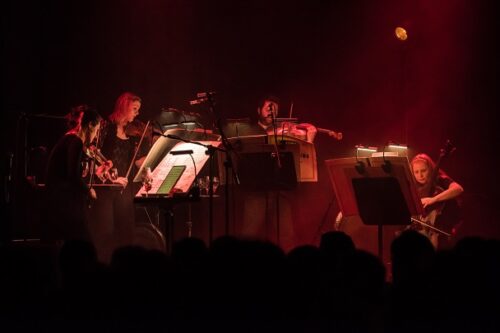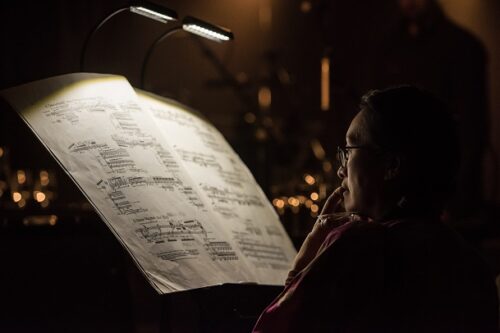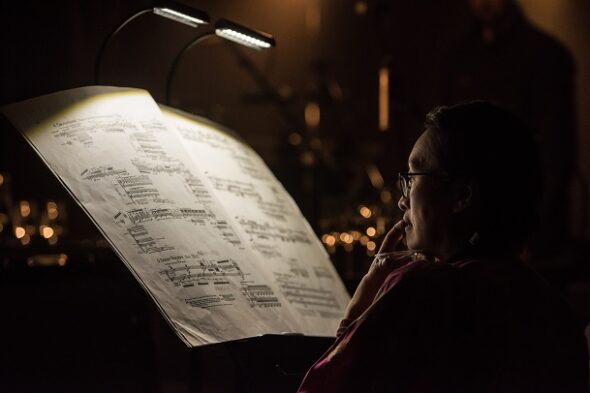 United Kingdom Manchester Collective: Rakh Singh (violin), Emily Nebel (violin), Alex Mitchell (viola), Hannah Roberts (cello); Joe Reiser (live sound). Kings Place, London, 24.3.2023. (JC)
United Kingdom Manchester Collective: Rakh Singh (violin), Emily Nebel (violin), Alex Mitchell (viola), Hannah Roberts (cello); Joe Reiser (live sound). Kings Place, London, 24.3.2023. (JC)

Gabriella Smith – Carrot Revolution
dmund Finnis – String Quartet No.2
Moor Mother – DREAM CULTURE
Schubert – Andante con moto from String Quartet No.14 in D minor, Death and the Maiden
George Crumb – Black Angels
Kings Place is emerging as an alternative venue for classical music, a melting pot where classical music mixes with pop, folk, experimental music, and genres which have yet to be defined. What Kings Place stands for was exemplified at a concert put on by the Manchester Collective, the final concert of their six-day UK tour.
The Manchester Collective is an arts organization known for the innovative programming which combines ‘cutting edge contemporary music, classical masterpieces, and staged work to a hungry, new audience’ (taken from their bio). Indeed, as a seasoned Wigmore Hall concertgoer, I stepped into Hall Two of Kings Place expecting strange set-ups and scraping sounds which I would find a rather far cry from the conventional definition of ‘music’; instead, I stepped into something that resembled more of a gig at Rough Trade East or even the Roundhouse. They even call it their ‘set list’ rather than programme, and ‘line-up’ rather than ‘performers’ on their website. There was a mild haze around the stage, with background music playing as rather hipster-looking audience members settled into their seats with their pints or glasses. The hall was pitch-black apart from the soft lights focused on the four music stands onstage; it was going to be a string quartet that evening.
Not only was the set-up unexpected, so was the music. American composer Gabriella Smith’s Carrot Revolution was an extroverted and energetic fantasy incorporating many different moods and rhythms — there was folk, pop and even a bit of Steve Reich! The Manchester Collective’s strong sense of rhythm and the great communication between the players brought the music alive and made it accessible to the audience members, many of whom were hearing this piece for the first time. It was a fun piece to open the show too; according to music director and string quartet leader Rakhi Singh, the composition incorporates a ‘chopping’ technique for the string players, the effect of which was rather quirky and adds a bit of spice to the performance. As Singh noted, the composition takes its inspiration from an Émile Zola quote which is all about new ways of looking at old things: ‘The day would come when one carrot, originally renders, would lead to a revolution’. Indeed, Carrot Revolution is all about incorporating new fragments from our current society into the age-old medium of the string quartet, and the Manchester Collective succeeded in creating something exciting from this contemporary composition, as well as whetting our appetites for the evening.
Edmund Finnis’s String Quartet No.2 followed; a composition commissioned by the Manchester Collective itself. In contrast to its extroverted predecessor that evening, the music of the Finnis stays afloat throughout, conveying an inward-looking atmosphere; yet never did the music feel static. The four brief movements are distinctive in their dynamic flow, even if the music retains a sense of harmonic calamity rather than drama. Especially significant was the way in which the voices imitate and connect with each other, forming an ever-flowing chain of sound. The amplifier used throughout the show seeks to ‘amplify’ this ‘surround-sound’ effect in the Finnis, as Rakhi claimed, but unfortunately, I thought it disrupted rather than enhanced the already beautiful string sounds written into the score.
The world premiere of Moor Mother’s DREAM CULTURE followed; a composition of ambient sounds which seeks to explore ‘the continuation of a dream state once we leave our places of rest’. This was a departure from the structural cohesive Carrot Revolution and Finnis Quartet. The music began with an ambient background music punctuated by drill-like beats and thumps, while a violin, viola and cello play a different texture over it; gradually the differing textures began to merge. Although I found the beginning, which creates a rather disturbing atmosphere, interesting, the music did drag on for quite a bit owing to the lack of any drama.

The highlight came in the second half, which contains the centrepiece of the show: George Crumb’s Black Angels. And what an exciting second half! The decision to perform the second movement of Schubert’s String Quartet in D minor, Death and the Maiden — which continually haunts George Crumb’s mysterious and ghostly Black Angels in different fragments and variations — was very effective, connecting the two pieces across vast tracts of temporal and philosophical landscapes; however, I do wonder if it would be more effective just to play the portion of the movement quoted in the Crumb. The Manchester Collective brought a great sense of understanding to the performance of this complicated masterpiece and ignited the hall with their vigour and spirit; they did not hold back at all even in the vocal chants. The intensity brought to the performance by the Collective’s attention to the score’s insistent detail (just to show us how insistent George Crumb was with his musical direction, they placed two copies of the score at the front of the stage for the perusal of the audience during the interval) revealed to me just how dramatic this work was. The sounds of other instruments and timbres were also imaginatively and accurately evoked by the string players onstage, making the scale of the musical work so much more than a composition for an amplified string quartet. When the Schubert fragment returned at the very end of Black Angels as ‘Threnody III: Night of the Electric Insects’, the effect was both haunting and bleak.
The Manchester Collective must be applauded not only for skilfulness in presenting a programme of contemporary music from across the spectrum, but also for their commitment towards presenting them with high quality performances. It was an enjoyable evening of discovery, entertainment and inspiration.
Jeremy Chan
